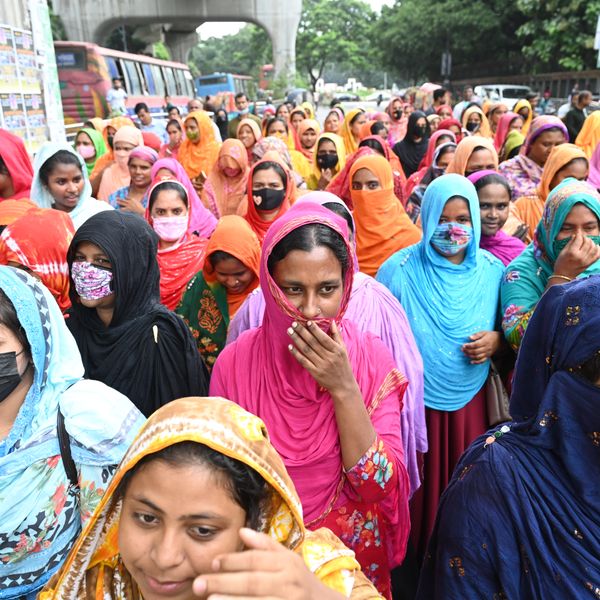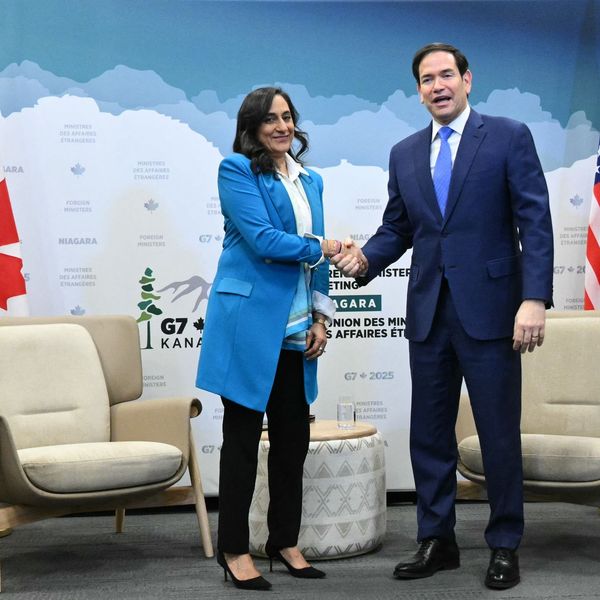Are Human Rights Violations Already Being Trumped By Corporate Trade Deal?
AP, Reuters report that Obama administration about to upgrade Malaysia's human trafficking status, seen as move merely 'for political expediency'
The Obama administration is reportedly poised to upgrade the ranking it gives Malaysia on its efforts to stamp out human trafficking. The move is being criticized as an affront to global human rights that could help move forward a pending controversial trade deal.
The State Department gives the ranking in its annual Trafficking in Persons (TIP) Report, a tool the Department states "reflects the U.S. Government's commitment to global leadership on this key human rights and law enforcement issue." In 2014 it gave (pdf) Malaysia the lowest ranking, a Tier 3, and stated: "The Government of Malaysia does not fully comply with the minimum standards for the elimination of trafficking."
Other countries the State Department designated as Tier 3 in its last report include Libya, Iran, Saudi Arabia, and North Korea. But unnamed government sources told the Associated Press and Reuters that the forthcoming 2015 TIP Report would upgrade Malaysia to a Tier 2.
AP reports that the change "is sure to ameliorate diplomatic relations as the Obama administration negotiates the Trans-Pacific Partnership trade deal, which includes Malaysia."
The Trans-Pacific Partnership (TPP) has faced opposition from a wide range of organizations who've charged that it allows corporate power to trump the environment, workers, and public health.
The reported ranking change has sparked the ire of Senator Bob Menendez (N.J.). As The Hill reports, the Democrat "specifically got a provision into a trade bill that would prohibit the United States from entering into trade agreements that are fast-tracked through Congress with Tier 3 countries, which Malaysia currently is."
He issued a statement to media Wednesday saying, "If [the upgrade is] true, this manipulation of Malaysia's ranking in the State Department's 2015 TIP report would be a perversion of the trafficking list and undermine both the integrity of this important report as well as the very difficult task of confronting states about human trafficking."
"The deplorable human trafficking crisis in Malaysia merits a global cry for action and justice--not an attempt to sweep them under the rug for political expediency," Menendez continued.
Human rights experts have also pointed to ongoing human rights violations in the country. Reuters reports: "In May, just as Obama's drive to win 'fast-track' trade negotiating authority for his trade deal entered its most sensitive stage in the US Congress, Malaysian police announced the discovery of 139 graves in jungle camps used by suspected smugglers and traffickers of Rohingya Muslims from Burma."
And Phil Robertson, deputy director of Human Rights Watch's Asia division, told the Associated Press: "Malaysia has little to distinguish its record on human trafficking since last year--its service to victims is poor, anti-trafficking law conceptually conflated with people-smuggling, and protection for vulnerable migrants minimal."
Andrea Powell, executive director of the anti-trafficking group FAIR Girls, wrote at MSNBC last month on how the TPP could be an incentive for Malaysia to address its reliance on slave labor. She described Malaysia as "one of the world's most egregious violators of basic human freedom," and continued, "If we care about ending slavery, we cannot allow Malaysia to join the Trans-Pacific Partnership."
Allowing Malaysia to join the TPP would "reward one of the world's most violently abusive countries with a trade agreement that will enrich those already profiting off of slave labor of millions of migrant workers.
"You cannot divorce the issues of trade and forced labor in a country dependent on the exploitation of millions of migrants to advance their economy," Powell wrote.
An Urgent Message From Our Co-Founder
Dear Common Dreams reader, The U.S. is on a fast track to authoritarianism like nothing I've ever seen. Meanwhile, corporate news outlets are utterly capitulating to Trump, twisting their coverage to avoid drawing his ire while lining up to stuff cash in his pockets. That's why I believe that Common Dreams is doing the best and most consequential reporting that we've ever done. Our small but mighty team is a progressive reporting powerhouse, covering the news every day that the corporate media never will. Our mission has always been simple: To inform. To inspire. And to ignite change for the common good. Now here's the key piece that I want all our readers to understand: None of this would be possible without your financial support. That's not just some fundraising cliche. It's the absolute and literal truth. We don't accept corporate advertising and never will. We don't have a paywall because we don't think people should be blocked from critical news based on their ability to pay. Everything we do is funded by the donations of readers like you. Will you donate now to help power the nonprofit, independent reporting of Common Dreams? Thank you for being a vital member of our community. Together, we can keep independent journalism alive when it’s needed most. - Craig Brown, Co-founder |
The Obama administration is reportedly poised to upgrade the ranking it gives Malaysia on its efforts to stamp out human trafficking. The move is being criticized as an affront to global human rights that could help move forward a pending controversial trade deal.
The State Department gives the ranking in its annual Trafficking in Persons (TIP) Report, a tool the Department states "reflects the U.S. Government's commitment to global leadership on this key human rights and law enforcement issue." In 2014 it gave (pdf) Malaysia the lowest ranking, a Tier 3, and stated: "The Government of Malaysia does not fully comply with the minimum standards for the elimination of trafficking."
Other countries the State Department designated as Tier 3 in its last report include Libya, Iran, Saudi Arabia, and North Korea. But unnamed government sources told the Associated Press and Reuters that the forthcoming 2015 TIP Report would upgrade Malaysia to a Tier 2.
AP reports that the change "is sure to ameliorate diplomatic relations as the Obama administration negotiates the Trans-Pacific Partnership trade deal, which includes Malaysia."
The Trans-Pacific Partnership (TPP) has faced opposition from a wide range of organizations who've charged that it allows corporate power to trump the environment, workers, and public health.
The reported ranking change has sparked the ire of Senator Bob Menendez (N.J.). As The Hill reports, the Democrat "specifically got a provision into a trade bill that would prohibit the United States from entering into trade agreements that are fast-tracked through Congress with Tier 3 countries, which Malaysia currently is."
He issued a statement to media Wednesday saying, "If [the upgrade is] true, this manipulation of Malaysia's ranking in the State Department's 2015 TIP report would be a perversion of the trafficking list and undermine both the integrity of this important report as well as the very difficult task of confronting states about human trafficking."
"The deplorable human trafficking crisis in Malaysia merits a global cry for action and justice--not an attempt to sweep them under the rug for political expediency," Menendez continued.
Human rights experts have also pointed to ongoing human rights violations in the country. Reuters reports: "In May, just as Obama's drive to win 'fast-track' trade negotiating authority for his trade deal entered its most sensitive stage in the US Congress, Malaysian police announced the discovery of 139 graves in jungle camps used by suspected smugglers and traffickers of Rohingya Muslims from Burma."
And Phil Robertson, deputy director of Human Rights Watch's Asia division, told the Associated Press: "Malaysia has little to distinguish its record on human trafficking since last year--its service to victims is poor, anti-trafficking law conceptually conflated with people-smuggling, and protection for vulnerable migrants minimal."
Andrea Powell, executive director of the anti-trafficking group FAIR Girls, wrote at MSNBC last month on how the TPP could be an incentive for Malaysia to address its reliance on slave labor. She described Malaysia as "one of the world's most egregious violators of basic human freedom," and continued, "If we care about ending slavery, we cannot allow Malaysia to join the Trans-Pacific Partnership."
Allowing Malaysia to join the TPP would "reward one of the world's most violently abusive countries with a trade agreement that will enrich those already profiting off of slave labor of millions of migrant workers.
"You cannot divorce the issues of trade and forced labor in a country dependent on the exploitation of millions of migrants to advance their economy," Powell wrote.
The Obama administration is reportedly poised to upgrade the ranking it gives Malaysia on its efforts to stamp out human trafficking. The move is being criticized as an affront to global human rights that could help move forward a pending controversial trade deal.
The State Department gives the ranking in its annual Trafficking in Persons (TIP) Report, a tool the Department states "reflects the U.S. Government's commitment to global leadership on this key human rights and law enforcement issue." In 2014 it gave (pdf) Malaysia the lowest ranking, a Tier 3, and stated: "The Government of Malaysia does not fully comply with the minimum standards for the elimination of trafficking."
Other countries the State Department designated as Tier 3 in its last report include Libya, Iran, Saudi Arabia, and North Korea. But unnamed government sources told the Associated Press and Reuters that the forthcoming 2015 TIP Report would upgrade Malaysia to a Tier 2.
AP reports that the change "is sure to ameliorate diplomatic relations as the Obama administration negotiates the Trans-Pacific Partnership trade deal, which includes Malaysia."
The Trans-Pacific Partnership (TPP) has faced opposition from a wide range of organizations who've charged that it allows corporate power to trump the environment, workers, and public health.
The reported ranking change has sparked the ire of Senator Bob Menendez (N.J.). As The Hill reports, the Democrat "specifically got a provision into a trade bill that would prohibit the United States from entering into trade agreements that are fast-tracked through Congress with Tier 3 countries, which Malaysia currently is."
He issued a statement to media Wednesday saying, "If [the upgrade is] true, this manipulation of Malaysia's ranking in the State Department's 2015 TIP report would be a perversion of the trafficking list and undermine both the integrity of this important report as well as the very difficult task of confronting states about human trafficking."
"The deplorable human trafficking crisis in Malaysia merits a global cry for action and justice--not an attempt to sweep them under the rug for political expediency," Menendez continued.
Human rights experts have also pointed to ongoing human rights violations in the country. Reuters reports: "In May, just as Obama's drive to win 'fast-track' trade negotiating authority for his trade deal entered its most sensitive stage in the US Congress, Malaysian police announced the discovery of 139 graves in jungle camps used by suspected smugglers and traffickers of Rohingya Muslims from Burma."
And Phil Robertson, deputy director of Human Rights Watch's Asia division, told the Associated Press: "Malaysia has little to distinguish its record on human trafficking since last year--its service to victims is poor, anti-trafficking law conceptually conflated with people-smuggling, and protection for vulnerable migrants minimal."
Andrea Powell, executive director of the anti-trafficking group FAIR Girls, wrote at MSNBC last month on how the TPP could be an incentive for Malaysia to address its reliance on slave labor. She described Malaysia as "one of the world's most egregious violators of basic human freedom," and continued, "If we care about ending slavery, we cannot allow Malaysia to join the Trans-Pacific Partnership."
Allowing Malaysia to join the TPP would "reward one of the world's most violently abusive countries with a trade agreement that will enrich those already profiting off of slave labor of millions of migrant workers.
"You cannot divorce the issues of trade and forced labor in a country dependent on the exploitation of millions of migrants to advance their economy," Powell wrote.

